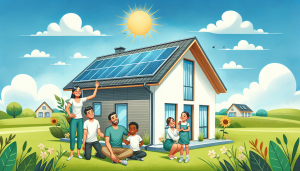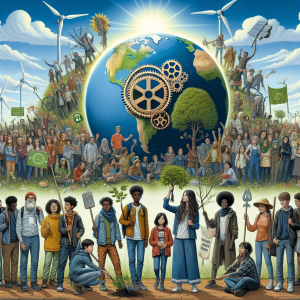Eco-Friendly Innovations: Top Picks for a Sustainable Lifestyle
Eco-friendly innovations have become increasingly prevalent as more individuals strive for sustainable lifestyles. These innovations not only help reduce the carbon footprint, but also promote a healthier environment. Embracing these advancements can lead to significant positive changes on both personal and collective levels. Here’s a look at top eco-friendly innovations that can help pave the way to a sustainable lifestyle.
One of the most impactful areas where eco-friendly innovations have taken hold is in the realm of renewable energy. Solar panels are at the forefront, allowing homeowners to harness the sun’s energy to power their homes. Modern panels are more efficient, affordable, and easier to install than ever before. Leveraging solar energy reduces reliance on fossil fuels and lowers electricity bills, making it a top pick for sustainable living.
Closely tied to solar energy is the advent of home batteries, like the Tesla Powerwall, which store energy generated from solar panels for later use. This ensures a continuous power supply even during cloudy days or power outages. Home battery systems enhance energy independence and are a smart investment for those looking to commit to renewable energy fully.
Wind energy is another sector making strides in sustainability. While traditionally associated with large wind farms, smaller home wind turbines have become available for residential use. Ideal for areas with steady wind patterns, these turbines convert wind energy into electricity, further decreasing reliance on non-renewable energy sources.
In the realm of transportation, electric vehicles (EVs) represent a significant innovation driving sustainable lifestyles. With zero emissions, EVs significantly reduce air pollution. Leading automotive companies are increasing their production of electric vehicles, making them more accessible. Additionally, advances in battery technology have extended the range of EVs, thus alleviating range anxiety, a common concern among potential buyers.
Public transportation is also undergoing eco-friendly transformations with the introduction of electric buses and trains. These modes of transport are pivotal in reducing the environmental impact of commuting. By choosing public transport solutions designed with sustainability in mind, individuals contribute to lower greenhouse gas emissions and reduced traffic congestion.
Electric bikes and scooters as personal transport options have also gained popularity as convenient and sustainable ways to navigate urban environments. These vehicles are perfect for short commutes or leisurely rides, offering flexibility while contributing to the reduction of fossil fuel consumption.
In the household, the use of smart home technology has enabled more efficient energy use. Smart thermostats like the Nest Learning Thermostat optimize heating and cooling schedules to match home occupancy patterns, thus conserving energy. Smart lighting systems adjust lighting based on natural light availability and room usage, further enhancing energy efficiency.
Water conservation is another critical aspect of a sustainable lifestyle. Innovations such as low-flow showerheads, dual flush toilets, and smart irrigation systems allow for significant water savings. These tools manage water usage without sacrificing performance, leading to a substantial reduction in water wastage.
Food consumption and production is another area undergoing transformation through eco-friendly practices. Vertical farming and hydroponics are innovating how we cultivate food; these methods use significantly less water and land compared to traditional agriculture. Moreover, urban gardens and home-grown produce reduce the need for long transportation chains, minimizing carbon emissions linked with food distribution.
A shift towards plant-based diets also supports environmental sustainability. The consumption of plant-based proteins over animal proteins reduces the demand for livestock farming, which is a significant contributor to greenhouse gas emissions. Innovations in food technology have led to the creation of plant-based meat alternatives that mimic the taste and texture of meat, offering consumers a sustainable yet enjoyable dietary option.
Packaged solutions like biodegradable and compostable packaging are replacing plastic, which is notoriously harmful to the environment. These sustainable packaging solutions break down more easily in the environment, lessening the long-term impact on the planet. Consumers can actively contribute to these efforts by supporting businesses that embrace sustainable packaging options.
Fashion is no exception to the wave of eco-friendly innovations. Sustainable fashion brands are adopting eco-friendly materials such as organic cotton, recycled polyester, and Tencel, a fabric made from sustainably sourced wood pulp. These materials require less water and energy to produce, aligning fashion with environmental consciousness.
Another promising innovation is the introduction of the circular economy model in fashion, which focuses on creating clothing that lasts longer, can be repaired, recycled, or composted, and minimizes waste. Companies are increasingly adopting this model, encouraging consumers to buy less but choose quality, fostering a more sustainable fashion culture.
Recycling and waste management innovations have seen significant advancements. Smart waste bins equipped with sensors can sort waste more accurately, reducing contamination rates and improving recycling efficiency. Composting systems that turn organic waste into nutrient-rich soil are being integrated into households and communities, promoting waste reduction and efficient resource use.
Finally, digital innovation has enabled apps and platforms that promote sustainability through consumer education and resource optimization. Apps that track carbon footprints, suggest eco-friendly habits, and facilitate the sharing of resources have empowered individuals to make informed lifestyle choices.
Embracing these eco-friendly innovations not only promotes a more sustainable lifestyle but also sets a precedent for future generations to follow. By integrating these practices into our daily routines, we contribute to a healthier planet and a more harmonious existence with nature. Implementing these innovations on a larger scale holds the promise of significantly reducing the environmental impact of human activities.




